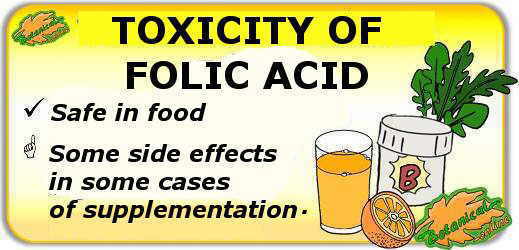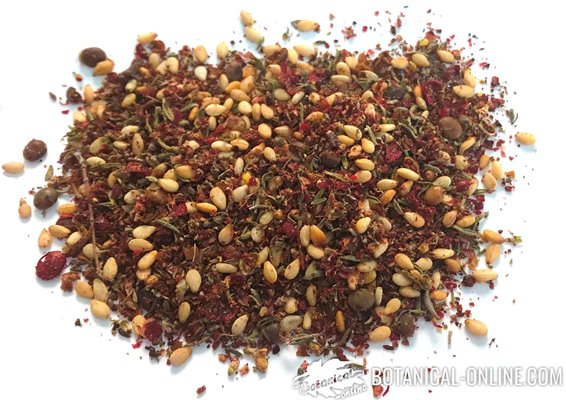Contents
- 1 Hazards and side effects of folic acid supplementation
- 1.1 What is folic acid and what are the supplements used for?
- 1.2 Folic acid toxicity
- 1.3 Uses of folic acid supplements
- 1.4 Indications and uses of folic acid
- 1.5 Adverse effects of folic acid supplementation
- 1.6 Amount or dose of folic acid recommended
- 1.7 Dangers of supplementing folic acid and vitamin B12 deficiency
- 1.8 Side effects of folic acid supplements
- 1.9 Toxicity due to excess of folic acid in megadoses
Hazards and side effects of folic acid supplementation
What is folic acid and what are the supplements used for?
Folic acid (vitamin B9) is a water-soluble vitamin B that is used both in naturopathic treatments and conventional medicine mainly for its properties as a cardiovascular health booster and as an essential vitamin for pregnancy.
This vitamin is also known as pteroylglutamic acid or folate.
Folic acid toxicity
Folic acid or vitamin B9 is not toxic since it is an essential component for life and it is naturally present in many foods of plant origin. It is very water soluble and the body can easily eliminate its excess through urine.
However, in certain pharmacological treatments, that is, through medications or supplements, folic acid can cause adverse reactions related to convulsive effects, zinc depletion due to decreased absorption, or masking a deficit of vitamin B12.
The most dangerous effect is that taking folic acid supplements can accelerate the damage caused by vitamin B12 deficiency, which usually occurs in vegetarians and the elderly, when there is a risk of B12 deficiency but it is not diagnosed. In these cases it is important to administer both vitamins B9 and B12.
Uses of folic acid supplements
Folic acid is a component naturally present in food. When you should increase folic acid, always recommend a diet rich in folates, in addition to studying a possible supplementation. The supplements never replace the diet.
Indications and uses of folic acid
- Preparation of pregnancy (both in men and women) and fertility problems
- Pregnancy and lactation
- Decrease cardiovascular risk (folic acid decreases levels of homocysteine, whose high levels are related to heart disease and high cholesterol problems and cardiovascular accidents)
- Smoking, as discussed in the previous point (in addition to quitting).
- Anemia due to lack of folates.
- Obesity and metabolic syndrome
- Coadjuvant in the treatment of cancer
Adverse effects of folic acid supplementation
In normal amounts, folic acid has practically no contraindications and can be safely supplemented in very high doses, 100% of the CDR (Recommended Daily Allowance).
The possible dangers detected of this vitamin are given by its excess in treatments that use megadoses of supplementation. They should not exceed 1000 mcg daily folic acid since higher and longer doses can cause seizures, zinc deficiency and vitamin B12.
In addition, very high doses (5000 or more mcg daily, equivalent to 5 mg or more) can worsen prostate or breast cancer. It is advised to consult with the doctor before starting any treatment with folic acid supplements at these doses. This becomes particularly mandatory in case of pregnancy, if you are taking any other medication, or if you have any disease.
Amount or dose of folic acid recommended
The advice is to consume foods rich in folic acid and, if necessary, take folic acid supplements containing between 400 and 1,000 mcg of this vitamin per pill or tablet. Note that the amount of vitamin is expressed in micrograms (mcg or μg) and not in milligrams (mg), and that this vitamin is covered in doses smaller than milligrams.
Supplements containing megadoses of folic acid without medical advice are not recommended. Megadoses of folic acid are considered to be supplements that contain milligrams (mg) of this vitamin instead of micrograms (mcg or μg). An example is the supplement Cilocid, which has 5 mg of folic acid.
In addition, B9 supplements should be combined with B12 supplements.
Dangers of supplementing folic acid and vitamin B12 deficiency
Vitamin B12 (cobalamin) and folate or folic acid (vitamin B9) are two vitamins that “work” together. It seems quite established that a disproportionate increase in folic acid (vitamin B9 as supplements of synthetic pteroylglutamic acid) may mask or interfere with the functioning of B12. This could manifest with neurological damage if the supplement is given in people with undiagnosed anemia.
The usual dose of supplementation is usually 400 mcg daily of folic acid combined with 1,000 mcg of vitamin B12.
Side effects of folic acid supplements
Folic acid supplementation in ranges of 400 – 1,000 mcg daily is safe and non-toxic (It has even been recommended to use 5-10 mg daily).
As side effects, it has been reported that healthy volunteers who received between 400 and 500 μg / day of folic acid had a slight depletion of zinc, by interference of the folate supplement with its absorption. This vitamin can also produce a yellowish coloration of the urine.
*Related information: Folic acid contraindications
Toxicity due to excess of folic acid in megadoses

Folic acid toxicity
Supplements or medications that contain high doses of folic acid have the following adverse effects:
- Effects on the central nervous system: In some cases, the administration of folic acid at a dose of 5 mg three times a day has caused sleep disturbances, irritability, malaise, excitability and hyperactivity. These effects disappeared or improved when you stopped taking the supplement (they usually disappear quickly, although there are cases that took 3 weeks). Sporadic, a worsening of psychotic symptoms and seizures have been reported.
- Gastrointestinal effects: Megadoses of 15 mg of folic acid daily have caused nausea, bloating, flatulence, bad taste in the mouth or bitter taste.
- Dermatological effects: A rash similar to allergic reactions has been observed, with erythema, pruritus and / or urticaria, which disappears in a few days after stopping treatment.
- Hypersensitivity reactions due to intravenous administration: One case of anaphylaxis was reported after intravenous administration of folic acid and the presence of facial angioedema.
* Related information:
– Folic acid diet during pregnancy
![]() More information on vitamins.
More information on vitamins.
| Vitamin B1(Thiamin) | Vitamin B2 (Riboflavin) | Vitamin B3 (Niacin) |
| Vitamin B5 (Pantothenic acid) | Vitamin B6 (Pyridoxine) | Vitamin B7 (Biotin) |
| Vitamin B9 (Folic acid) | Vitamin B12 (Cobalamin) | Choline |
| Inositol | PABA | Lipoic acid |
![]() More information about vitamins.
More information about vitamins.








